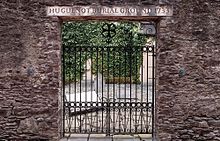
Summary
Huguenot Cemetery was created between 1710 and 1733 as a cemetery for the Huguenot inhabitants in the city of Cork.[1] It is believed to be one of the last two surviving Huguenot graveyards in western Europe.[2]
| Huguenot Cemetery | |
|---|---|
 | |
| Religion | |
| Affiliation | Huguenot |
| Ecclesiastical or organizational status | Closed |
| Year consecrated | 1733 |
| Location | |
| Location | Cork, Ireland |
 Shown within Ireland | |
| Geographic coordinates | 51°53′55″N 8°28′25″W / 51.89874°N 8.47368°W |
Cemetery edit
About 5,000 Huguenots came to Ireland during the time when they were fleeing religious persecution, following the revocation of the Edict of Nantes in their native France.[3] Hundreds of these refugees settled in Cork. In the area of Lumley Street,[3] now known as French Church Street, they built a school, an almshouse and a graveyard.[4] The cemetery is home to the remains of some of the most prominent Huguenots of the city and it is understood that the remains of at least one former Lord Mayor of Cork are held within. The last recorded use of the graveyard for burial was in 1901. The cemetery is a recorded monument.[1][2]
Further reading edit
- "Huguenot Cemetery, Carey's Lane". Corkcity.ie. Retrieved 23 October 2016.
- "Huguenot Graveyard". Corkpastandpresent.ie. Retrieved 23 October 2016.
- "Huguenot Burial Grounds – Huguenot Society of Great Britain & Ireland". Huguenotsinireland.com. Retrieved 23 October 2016.
- "Huguenot Cemetery, French Church Street, Cork City, Cork City: Buildings of Ireland: National Inventory of Architectural Heritage". Buildingsofireland.ie. Retrieved 23 October 2016.
- "Huguenot Commemoration". Oscailtmagazine.com. Retrieved 23 October 2016.
- "17194 « Excavations". Excavations.ie. Retrieved 23 October 2016.
- Ben Wright (2013). Flamenco Fugues. AuthorHouse. ISBN 978-1-4817-5253-4.
- Grace Lawless Lee (2009). The Huguenot Settlements in Ireland. Genealogical Publishing Com. pp. 80–. ISBN 978-0-8063-4929-9.
References edit
- ^ a b English, Eoin (23 May 2006). "City steps in to save Huguenot cemetery". Irish Examiner. Retrieved 31 July 2021.
- ^ a b "Cork City Council buys Huguenot graveyard to save it from development". Irishtimes.com. 24 May 2006. Retrieved 23 October 2016.
- ^ a b "Huguenot Community in Cork – Celebrating Cork Past". Celebratingcorkpast.com. Retrieved 23 October 2016.
- ^ Antoin O'Callaghan (2016). The Churches of Cork City: An Illustrated History. History Press. pp. 172–. ISBN 978-0-7509-6864-5.
External links edit
- Huguenot Cemetery, Cork at Find a Grave


